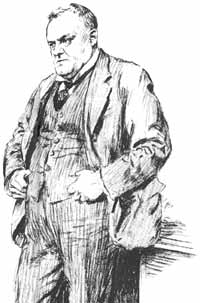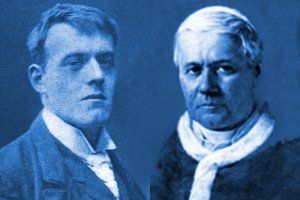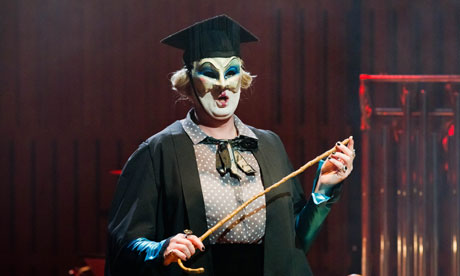
Of course, to Belloc, being described as a Catholic historian would have seemed something of a tautology. In an eminently lucid article he wrote in the 1930s (“The Historian”, collected in “One Thing and Another”) he begins a long exposition of the nature of the historian by defining the creature in question as one “who tells a true story in writing”. This is something of a disappointingly basic definition, on one level. But as Belloc explains each of the key terms in this clause it becomes clear that he means something very particular indeed. After setting out that a historian can either write for those who share his world-view or for those who do not, that essential to true history is proportion and factual establishment, he adds: “without a true philosophy – that is a true religion – true history cannot be written”. And this is the nub of it. Belloc would admit that non-Catholics could write good history, but it was either accidentally good, that is good despite their own views, or it was history of a period when the “Catholic dilemma” (to revile it, laud it, or treat it – as Belloc did – as it deserved to be treated in its historical context) did not apply. For Belloc, the end of history was “the establishment of the Truth”. As this Truth was essentially connected to matters of Theology and to the central fact of the Incarnation, history that failed to recognise the presence of Christ in the world (a presence for Belloc particularly visible in His Mystical Body, the Catholic Church) was false history. Better that a man should revile it but recognise it than not see it at all or pretend its non-existence.
Given this signal fact, it is perhaps unsurprising that lazy and sceptical moderns have a very low opinion of Belloc as an historian.
However, it is necessary to say that while suspicion of his Catholic sympathies underlies this low opinion, there is more to it than that. There can of course be no doubt that Belloc had the intellectual apparatus to write what even moderns would currently accept as competent and accurate history.
A first class Honours degree from
Oxford University was not given for oratorical abilities or prose skills alone. And there can be no doubt that Belloc was one of the greatest animators of the historical past in the English language. Belloc knew that in the accurate invocation of the past lay as much Truth as in his analysis (his ability to summon up the past belies to some extent the sceptic in him, in the same way that his frequent tears during the last line of the “O Salutaris Hostia” belie his claim to be incapable of religious feeling). Certainly he was the greatest of the animators of the past to escape the ludicrous Whiggisms that so beset Macaulay’s majestically evocative prose.
Macaulay could write beautifully - but Belloc could write just as well, and most historians, even modern ones, would have to concede that Belloc was in general terms more accurate.
The truth is that historians are wary of Belloc.
Many easily disparage him; a good number airily admit his talents but would not admit him to the reading list for their students; few will risk praise. Guedella, a near-contemporary historian of good standing even today, sought Belloc’s advice and research skills on occasion: and Norman Stone (Margaret Thatcher’s favourite historian, some have mischievously claimed) said in a comparatively recent newspaper interview that “in the end, I shall go to Trevelyan’s enemies, Hilaire Belloc and Lord Acton, both Catholics, for an understanding of modern England.”.
No doubt, on a purely academic level even his greatest advocates would advise some caution (which says something about the desiccated nature of academic history).
On a personal note, as I was about to depart for
Oxford to read Modern History (sadly not at Balliol - although it was a lesser place in my time) I was warned off Belloc by one tutor, only to find his books on the reading list of another (a rarity!).
“Read him first” I was told by this approving don (who yet did not like Chesterton).
“He is largely right in his conclusions, somewhat over-selective in his facts: most of what you will read thereafter you will find happily fits into his analysis, which is as it should be, because, as I said, he is indeed largely right.”
The reasons for Belloc’s uncertain reputation are principally three: he (they say) wrote history as propaganda, selective, biased history that reflected his own desire to exalt Catholicism; he (they say) made many simple and glaring errors in his books and was lackadaisical about correcting them in subsequent editions - a sure sign of someone who was indifferent to truth; he (they say) didn’t reference his sources and therefore
a priori has to be treated as untrustworthy and his books ill-researched.
Firstly, it has to be understood that no history can be written, humanly speaking, with absolute objectivity or lack of bias. The golden ideal (as some moderns would have it) of “perfect history” is unattainable by man (and therefore, thank God, by machine). It is impossible for any historian not to be selective in his facts and evidence. All historians (except some of the moderns who think such things beneath them) attempt to reach conclusions, and in so doing can logically be accused of bias and selectivity in that attempt. The amusing charge of propaganda I will come to later.
Secondly, Belloc acknowledged his inability to get every fact right all the time, and remarked frequently upon other historians’ failure ever to get anything fundamentally right. Quite how so many more accurate historians could count every single tree and list them by species and size and never see the wood was something that often caused Belloc great mirth. Belloc was often slapdash (except with regard to his “set-pieces” which I will shortly touch upon), rarely checked his facts once written down, and never checked his publishers’ galley proofs (if he could help it). In writing his study of James II, in North Africa of all places, with the Sahara as the rather discordant backdrop, a task which he accomplished in ten days, he relied upon a small book of notes and his voluminous but not infallible memory. What was remarkable about Belloc was the fact that any errors he committed in no way impaired his ability to discern the Truth or seriously undermined the strength of his conclusions.
Thirdly, Belloc
loathed the systematic and frequent use of footnotes. I wish I had the space here to quote from some of Belloc’s humorous rants against the use of footnotes.
The prime cause of this loathing was Edward Gibbon who, in his “Decline and Fall of the
Roman Empire”, showed rare mastery of the black art of deceitful foot-noting.
Belloc’s loathing was also a reaction against the growing paralysis hindering historical writing with historians often writing only for other historians and consequently keen to devote to each line of their text at least six lines of self-important foot-notes.
This habit particularly beset the French “annaliste” school of social historians whose books often resembled nothing more than a compilation of references, end-notes, foot-notes and bibliographies.
Belloc often remarked that history had to be readable to be history, which would immediately sweep numerous modern histories into the pulper (“that dense phalanx of modern academic historians whose work is as dry and dissociated, as detailed and formless, as sawdust, and properly speaking is not history at all.”). The perverse inwardness and self-congratulatory attitude of over-referenced works Belloc found positively fetishistic.
He believed most foot-notes to be unnecessary: they often referred only to other secondary sources which themselves then did likewise, and one - pursuing the distant hope of a primary source - was often left dismayed.
Often, when followed up, the source referred to was found to contradict the text, or to be entirely outwith its relevance (this was a particular fault - trick! - of Gibbon’s).
Footnotes were seemingly used as academic semaphore, to demonstrate supposed mastery of a period to other insecure historians, and to signal dominance over the
hoi polloi who must bow down before the properly indicated learning of the writer in question.
Belloc understood the importance of the primary sources more than most historians of today. Indeed he was, more than other historians, forced to rely upon the original evidence since so much of the historical commentary that had been written in English was Whiggish, Protestant bunk. Even now, historians - yes, modern ones - are discovering just how much of the detail that he put into some of the more descriptive passages of his histories is borne out - is indeed founded upon - the very close study of previously neglected primary sources.
I will now come on to a fourth point, which I think lies behind much of the above criticism of Belloc’s historical writings, and which is touched upon by the accusation of propaganda. Belloc is a deliberately and strenuously didactic historian. This a great heresy these days, as it was to some degree when he wrote; and is an even greater heresy on account of what Belloc was being didactic about. In our universities, more frequently than not, history is now written as a bare, turgid stream of data capped with a pleading codicil from the author that the facts are so complicated that he can see no pattern but the hope remains that some pattern may be discerned in the future. (Some hope! Students trained by blind teachers will seldom understand what they see, even if they see it.) When opinion surfaces at all, it is tentatively held and robustly restrained from being presented as fact. The only dogmas offered up to the hungry masses are the thin and poisonous gruel of the unsurpassed excellence of liberal, secular, capitalistic democracy (which Belloc saw as the dung it was). Modern historical study so often languishes blankly in agnosticism: Belloc’s history was certain, decisive, trenchant, the very qualities that weak-willed prevaricators loathe in the Faith. How absurd it is that so many present-day academic institutions should be so empty of the desire to teach, or of the knowledge of what should be taught.
Belloc would also have laughed at those moderns who sneer at historical biography and consider it as a low form of intellectual work, mainly the province of the amateur rather than academic historian.
Although this view isn’t as widespread amongst academic historians as it was in my own time at University, it still holds sway in many faculties across the land.
Most of Belloc’s histories are in fact biographical studies.
As someone who appreciated the full wickedness of materialistic, monist, pseudo-scientific and proto-Marxist histories, he grasped that Man and not some impersonal (often philosophically convenient) force was, under God’s Will and His Providence, the most important force in history.
As a believer in Free Will (which determinists notoriously take for granted in their personal lives and only dare reject when they preach their deceit from the pulpit) he knew that human motives were crucial to understand any period of history and used the lives of great men to illumine their age.
He would also have reviled the modern trend of psycho-sexual obsessiveness.
Written historical biographies – and, even more noticeably, television and radio documentaries - seem unable to free themselves from the Freudian idée fixe that a man can be best measured by the extent of his sexual appetites or by the “complexity” of his perversities.
For Belloc, history for history’s sake (indeed, biography for biography’s sake) was as great and dangerous a lunacy as art for art’s sake.
History, as all things, must serve Truth, for all history was the record of conflict of one kind or another, and all conflict was ultimately theological, residing within the frame of the great Truths of the Faith.
In short, the fact that Belloc often did write what moderns would not accept as competent or accurate history is something that redounds to the discredit of the moderns, not of Belloc.
His sights were set very much higher than the sort of thing churned out by the gallon from educational institutions today.
If Belloc were available on prescription he should without hesitation be recommended to every history faculty in the West (and beyond) as an antidote to wretched agnosticism and relativism, and to the ignorant slavery that still ties most historians to the bare few “facts” of contemporary thought that still prevail – the supremacy of democracy, the progressive effects of capitalism, and the abhorrent nature of the old Catholic order.
Belloc taught history as FACT in his books, fact unsullied by the nauseating smugness of the historians of his time (and ours) who worshipped the Money power at the altar of secular, liberal, democracy.
He knew that a true understanding of fact required a true understanding of reality, an understanding almost uniquely preserved within the Faith.
He considered it easier for a camel to pass through the eye of a needle than for a man with no understanding of the Faith to write true history.
In our age, when reality as understood by the vast majority of our peers seems even further from the teachings of Christ and His Church, who can say that he was wrong?
Michael Hennessy
[adapted from his introduction to Hilaire Belloc’s “Charles I”, recently re-published by IHS Press]















